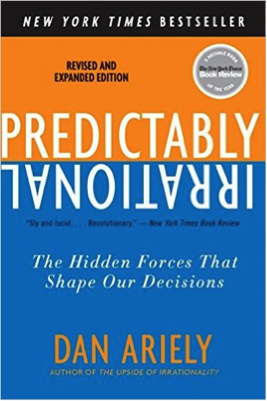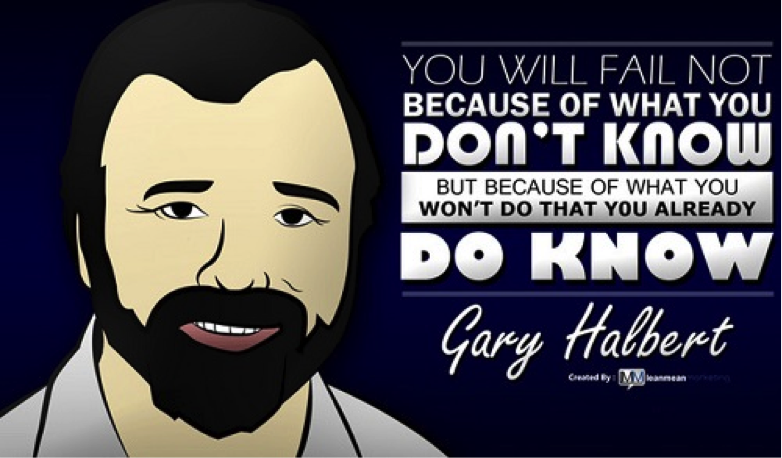Who doesn’t love a shortcut on the road to success?
And if there’s anything we know for sure about successful people it’s that they hang out with, learn from, and emulate other successful people.
It’s the reason smart folks will pay tens of thousands of dollars for coaching or to belong to a mastermind group that gives them the inside scoop on what the heavy hitters in their field are doing.
The trouble is, just because a marketing wizard like Seth Godin eats avocado and blue-cheese sandwiches every day for lunch (he doesn’t, as far as I know), don’t assume that’s the reason he’s successful.
But drawing erroneous conclusions in business is a long-standing tradition.
So here are 5 big marketing “Do as I say, not as I do” tips we’ve been sold over the years that you DON’T want to model… because they just don’t stand up under the scrutiny of a silly-little thing called ‘results.’
#1: Any Marketing at All is Better than Nothing!
Now here’s a big surprise.
What the gurus TELL you to do isn’t necessarily what THEY do.
It’s like the rest of life where hidden truths knock down the high and mighty like bowling pins.
And being an insider, I get to hear the real story from many famous entrepreneurs you’d think are fabulously successful… yet they’re struggling worse than their most in-debt customers.
Sad, but true (can’t mention any names).
So my advice?
WATCH to see how you’re marketed TO.
In other words, don’t blindly follow self-serving advice that basically just sells someone’s courses.
On the contrary, in my early years of marketing when I was getting Dan Kennedy’s newsletter, Dan DID exactly what he told ME to do in his monthly masterpieces.
He was selling ALL the time, in obvious and subtle ways… and still showing me how he was doing it… AS he was doing it!
I trust a guy who’s walking his walk.
One other thing.
Bad marketing costs your business in more ways than you realize:
1) The reputation and ‘face’ of your business is initially established through the way you choose to market yourself. It’s your first impression and hopefully your best foot forward. Half-assed marketing costs you time and customers. It’s that simple.
2) This one’s obvious but always bears repeating. When done poorly, marketing eats your budget like a honey badger munching a snake. If you don’t get it right, you might as well throw another stack of 100-dollar bills on the fire to heat your office while you’re at it. When it’s done well, marketing costs you nothing.
3) With bad marketing, the cost isn’t just wasted money. It’s also turning customers OFF… inoculating them AGAINST YOU because they’re getting messages they don’t like or want.
So get it right!
#2: Creativity Sells… NOT!
We all need a reminder of this one now and then.
Especially when we try to get too fancy with our marketing.
And so many new entrepreneurs are seduced by things like Super Bowl ads or some other fancy-schmancy advertising that’s hilarious, beautiful, amazingly creative… but doesn’t sell it’s way out of a paper bag.
Have you ever heard of the Taco Bell Chihuahua who would say, “Yo Quiero Taco Bell,” or, “I want Taco Bell!”
Everybody loved it and the expression became a national phenomenon back in the late 90’s.
Did the $200 million invested in the campaign sell more tacos?
No, but it sold a lot of Chihuahua merchandise.
So they scrapped the campaign and hired a new ad agency.
It’s why marketing legend, Gary Halbert said, in one of his newsletters…
“Have you ever heard of the Caples Awards? John Caples is one of my marketing heroes, but the new wrinkle in the awards given in his name makes me sick. You know what some slobs have decided about the Caples Awards? It’s this: The direct marketing piece in contention doesn’t have to be a winner for the writer to win the award, it only has to be “creative.”
“Isn’t that nice? It must truly cheer many a client’s’ heart, after being rendered damn-near destitute by some fool’s bird-brained, stupid ad campaign, to know the writer won the ‘Caples.’”
Now don’t get me wrong, I’m not saying that creativity is useless.
Creativity is incredibly important.
But using it for its own sake is like running with scissors… very dangerous.
#3: If It Doesn’t Get Immediate Results, It’s Not Working.
This is another great one for selling courses.
If technique “A” doesn’t knock it out of the park, I’ve got “B” through “Z” for immediate purchase.
And while there can be truth to this, it’s oversimplified and rash to conclude that if you don’t see instant results you’re on the wrong path.
It’s like your first date that doesn’t end with a marriage proposal, it doesn’t necessarily follow that it was a failure.
Likewise in marketing, customers usually need many more contact opportunities than most entrepreneurs might think (or want), prior to making a purchase.
The exact number depends on what you’re selling and to whom, but there are some guidelines.
Many years ago the magic number was believed to be about 3, then a few years later it was 5.
Currently statistic trackers in the business believe it’s more like 7 (which is why email is so great).
And with non-stop marketing input thrown at us 24/7, we’ve had to tune out more and more just to stay sane.
It’s like Uncle Rick who traps you at every holiday gathering and yammers your ear off.
Let’s be honest, you couldn’t possibly listen to everything he has to say, nor do you want to.
And frankly, not hitting a home run is where you START…
… Not where you quit.
In a recent campaign we had great open rates on the emails, great click through rates, and great registrations for a webinar.
But the show-up rate was way off.
So did we throw the baby out with the bathwater?
No way.
We tweaked the “You’re registered” email and added more benefits about the webinar.
We ran the new copy and presto… our analytics showed we were back on track.
So be patient and study your stats incessantly, which leads me to more B.S….
#4: Trust Your Gut!
Woah. This one is really dangerous.
And to drive the point home, read Dan Ariely’s book, Predictably Irrational: The Hidden Forces That Shape Our Decisions.
 Dan is a Professor of Psychology and Behavioral Economics at Duke University, i.e., he’s no slouch.
Dan is a Professor of Psychology and Behavioral Economics at Duke University, i.e., he’s no slouch.
And he knows how weird we are when it comes to making decisions.
But it’s even weirder that we think we’re so logical.
Take his example of the breadmakers sold in stores.
On one side, smart retailers position the low-end breadmaker that nobody wants.
At the other end of the counter they have the super-high end machine that is so ridiculously expensive that shoppers see it and wonder, “Who on earth would waste that much money on a breadmaker?”
So of course, the expensive one makes the midrange bread maker… which is what they want you to buy because the profit margin is fantastic… seem like an astonishingly great deal.
But here’s what’s even weirder.
Even if you totally get this principle, are aware of it, and are on guard against it… the damn thing still works.
Try it on yourself.
Look at a well-designed offer and see if you can’t f-e-e-l the way the relative prices affect you.
It’s uncanny.
#5: I Have a “Unicorn” Business
I could have said Yeti or Bigfoot.
Because they all represent the same thing… some rare anomaly of a business and the owner thinks it’s unique.
And to cut them some slack, it can sure seem that way.
But marketing principles remain constant regardless of whether you sell facial massages, farm machinery, or insurance.
The rules of persuasion don’t change according to the product or service.
We all have unique businesses, but the psychology of sales is science with a hint of art, and not the other way around.
It’s math and applied psychology.
In other words, I’m hitting you AGAIN with one of my pet peeves, just presented a little differently.
Entrepreneurs who insist, “My business is different.”
Entrepreneurs who insist their businesses are unicorns are not rare, but they are wrong.
Now don’t go too crazy tonight.
Start 2018 off with a clear head.
We’ve got your back.
And post your comments below.




Love love love the points made here, thank you!! As the owner of a very fledgling busines I am bombarded with “let me teach you…” emails on everything from Website building and seo optimization to sales and marketing. I do not have a unicorn nor do I believe in “overnight” success so your article gives me hope!